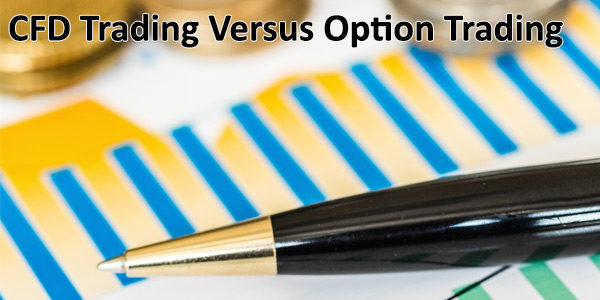Today we’ll take a closer look at Contracts for Difference or CFD Trading versus Options trading and identify the key advantages and disadvantages of both.

When looking to trade CFDs, options or futures contracts, it’s important to understand they are all ‘derivative’ products which mean their price ‘derives’ from something else.
In the case of CFDs, options and futures derivatives, all of their prices derive from the stock, index or commodity they are tracking.
We are commonly asked ‘which derivative is best?’.
Is a CFD better than an option or a futures contract?
There is no simple answer to this question because the derivatives are all different.
Some strategies which can be implemented with options or futures cannot be implemented with CFDs. Despite this, CFDs are a fantastic instrument to trade.
An option is the right to buy or sell a set number of shares (usually 100) on or before a set date. Note that with options you have the right to buy or sell meaning you are under no obligation to do this.
When trading in CFDs, both the buyer and seller have an obligation to settle the difference in cash at the end of the transaction.
The CFD trader can choose the size of their position down to as little as one contract.
Do not underestimate that subtle point of being able to trade with as little as one contract. This is fantastic for those starting out or if you are testing a new trading system.
For options, you pay out a small premium, which gives you access to the movement in the share for a set time.
If you are right, you receive an amount of cash back.
If you are wrong, you forfeit the small premium.
CFDs are a much less complicated derivative than options.
Trading CFDs is very similar to trading the underlying share.
CFDs have:
In the options market, you can choose to write options.
Because of this, it is possible to combine options to create different strategies that cannot be created with CFDs. There is no equivalent to writing options with CFDs.
Click play on the video below to watch a 1min explanation of expiration around options vs CFDs.
CFDs provide a wide choice of instruments to trade. With some CFD Brokers, it is possible to trade more 10,000 trading instruments, covering all the global markets.
Also, you can trade indices, commodities and Forex. No other derivative available today allows this much choice. In Australia, options are limited to a select number of shares, and you need to watch out for liquidity.
In Australia, options are limited to a select number of shares, and you need to watch out for liquidity.
Trading options in Australia used to require contract sizes of 1,000 shares. In 2017, trading one options contract now controls 1,000 BHP shares for example.
What is liquidity?
Liquidity, in this case, means the number of buyers and sellers present at any one time. The more buyers and sellers, the easier it is to transact at your preferred price.
When there are fewer buyers and sellers, it means you have an illiquid market. Illiquid markets are difficult to buy and sell at your preferred price.
Two types of options can be traded, either a call option or a put option.
You buy a call option if you believe the instrument is going up and you buy a put option if you believe the instrument is going down.
If you are correct on the direction of the movement, you can make a profit. If you are wrong, you may lose the premium you paid.
CFDs provide the ability to trade both long and short with ease.
For Short Selling, you open the position by selling it first. To close it, you buy it back.
There are no complicated rules to follow or different instruments to choose. CFDs are simple to understand and trade. But don’t misunderstand the word simple for not being risky. CFDs are derivatives, which are sophisticated trading products and you must know the risks involved before you start trading.
Option pricing is quite complex and not for the faint-hearted. It is affected by the share price, exercise price (strike price), volatility, time, dividends and interest rates.
CFDs are very simple because they match the underlying instrument.
There are no complex pricing models to learn with CFDs: if the share moves $1, so does the CFD.
When trading options, the risk is limited to the initial investment (unless you write naked options where your risk is potentially unlimited), while CFDs carry theoretically unlimited risk.
It is critical for CFD traders to manage their risk to ensure their survival. We’ve got a few other CFD trading tips to help you out as well.
It is impossible to say whether CFDs are the right instrument for you to trade. Only you can decide that.
For more information, head over to the ASX website. They have an excellent Understanding Options guide.
Consider the risks of both options and CFDs, consider the flexibility of each product and then decide the right instrument for your circumstances.